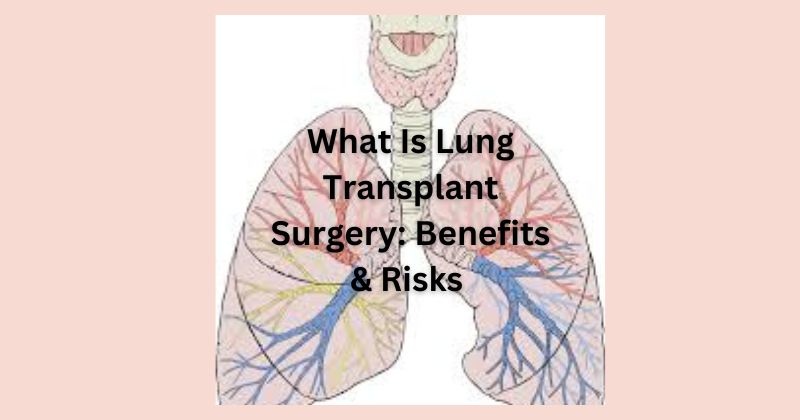Surgeons perform lung transplant surgery, a complex and life-saving procedure that involves replacing a diseased or failing lung with a healthy donor lung. Doctors consider it when other treatments for chronic lung diseases, such as COPD, pulmonary fibrosis, and cystic fibrosis, have failed. This surgery can drastically improve the quality of life for individuals with severe respiratory conditions, allowing them to breathe more easily and increase their life expectancy.
Understanding Lung Transplant Surgery
The lungs are vital organs responsible for oxygenating the blood and removing carbon dioxide. In cases where a person’s lungs can no longer perform these essential functions due to disease or damage, a transplant may be the best option. Lung transplant surgery can involve replacing one lung (single lung transplant) or both lungs (double lung transplant), depending on the patient’s condition and the severity of their disease.
Why Is Lung Transplant Surgery Needed?
Lung transplants are recommended for individuals with end-stage lung disease when no other medical treatments or therapies can manage the symptoms. Some of the most common conditions that may lead to a need for a transplant include:
- Chronic Obstructive Pulmonary Disease (COPD) – A progressive lung disease that makes it difficult to breathe.
- Pulmonary Fibrosis – A condition where the lung tissue becomes scarred and stiff.
- Cystic Fibrosis – A genetic disorder that causes severe damage to the lungs.
- Idiopathic Pulmonary Arterial Hypertension – High blood pressure in the arteries of the lungs.
Benefits of Lung Transplant Surgery
- Improved Quality of Life: After a successful transplant, most patients experience a dramatic improvement in their ability to breathe, increased energy levels, and an overall better quality of life.
- Increased Life Expectancy: Lung transplantation can significantly extend the lifespan of individuals suffering from end-stage lung disease. On average, recipients can live 5-10 years after the transplant, with some living even longer.
- Better Exercise Capacity: Individuals who undergo transplant surgery often find they can engage in physical activities, which was not possible before due to their respiratory issues.
- Relief from Symptoms: Patients who underwent a lung transplant experience relief from chronic coughing, shortness of breath, and other debilitating symptoms associated with lung disease.
Risks of Lung Transplant Surgery
- Rejection of the Donor Lung: After a transplant, the body’s immune system may recognize the new lung as foreign and attempt to reject it.
- Infection: Since transplant recipients must take immunosuppressants to prevent rejection, they are more vulnerable to infections. These infections can be severe and even life-threatening.
- Surgical Complications: As with any major surgery, lung transplant surgery carries the risks of bleeding, blood clots, and complications from anesthesia.
- Chronic Rejection: Over time, the transplanted lung may develop a condition called “chronic rejection,” where the lung gradually loses its function, making it necessary for the patient to be listed for another transplant.
- Graft Dysfunction: The transplanted lung may not function properly, leading to difficulties with breathing and the need for further interventions.
Lung Transplant Surgery in India: A Growing Option
India has emerged as a leading destination for advanced medical treatments, including lung transplants. With its state-of-the-art hospitals, skilled surgeons, and affordable healthcare, India offers world-class medical services to both domestic and international patients.
Best Hospital for Lung Transplant in India
Several top hospitals in India specialize in transplant surgery. These hospitals are equipped with modern medical technology, offer expert care, and have high success rates. Some of the best hospitals for lung transplants in India include:
- Medanta – The Medicity (Gurugram): Known for its world-class medical care and experienced lung transplant specialists.
- Apollo Hospitals (Chennai, Delhi): Offers advanced transplant surgeries with a dedicated team of specialists.
- Fortis Healthcare (Delhi, Mumbai): Another leading hospital chain that performs successful lung transplants with modern facilities.
- Global Hospitals (Hyderabad): Renowned for its expertise in organ transplants, including transplants.
- Max Super Speciality Hospital (Delhi): A top hospital offering high-quality transplant services.
These hospitals have gained recognition for their success in performing transplants, attracting patients from across the world.
Lung Transplant Surgery Success Rate in India
India has a remarkable transplant success rate, with many hospitals reporting successful outcomes. The lung transplant success rate in India is on par with international standards, with 80% of patients surviving for more than five years after the surgery. The success of the surgery largely depends on the condition of the patient, the quality of the donor organ, and the skill of the medical team performing the procedure.
Conclusion
Lung transplant surgery offers a second chance at life for patients with end-stage lung diseases. While it is a complex procedure with potential risks, the benefits—such as improved quality of life, increased life expectancy, and relief from debilitating symptoms—significantly impact patients. India attracts many individuals seeking lung transplant surgeries due to its advanced medical facilities, experienced surgeons, and affordable costs. If you consider lung surgery, exploring the best hospitals for lung transplants in India is a wise decision that could lead to a successful recovery and a better future.
For more(click here)






